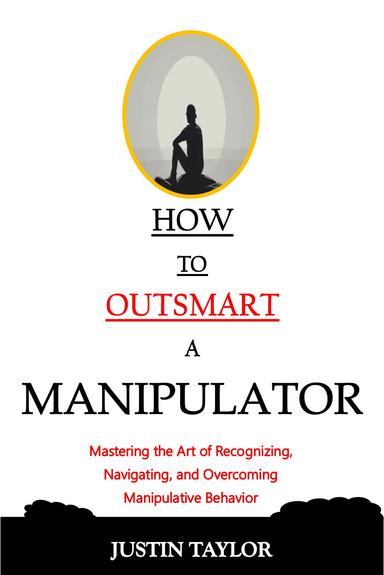One late night, while browsing through the Lulu bookstore in search of self-help books, I stumbled upon How to Outsmart a Manipulator by Justin Taylor. The title immediately caught my attention, resonating with my recent experiences. I had been grappling with the realization that a close friend had been subtly manipulating me. Their constant need for control, the guilt-tripping, and the way they twisted situations to their advantage had left me feeling confused and emotionally drained. I hadn't recognized these behaviors as manipulation until I saw this book. Hoping to find clarity and regain control over my interactions, I purchased it.
Reading Taylor's book was an eye-opening experience. It not only helped me identify the manipulative tactics used against me but also provided practical strategies to counteract them. Here are ten invaluable lessons I learned:
1. Recognize Manipulative Behavior Early
Taylor emphasizes the importance of identifying manipulation before it takes hold. He outlines common tactics such as guilt-tripping, gaslighting, and playing the victim. Understanding these signs enabled me to spot manipulation in its early stages and address it promptly.
2. Understand the Psychology Behind Manipulation
The book delves into the psychological mechanisms manipulators exploit, such as our desire for approval or fear of conflict. By understanding these, I became more aware of my vulnerabilities and learned to protect myself from being exploited.
3. Set Clear Boundaries
Taylor stresses the necessity of establishing and maintaining personal boundaries. He provides guidance on how to communicate limits assertively and the importance of consistency in upholding them. Implementing this advice helped me reclaim my personal space and autonomy.
4. Build Emotional Resilience
Manipulators often target emotional weaknesses. The book offers exercises to strengthen emotional resilience, such as mindfulness practices and self-reflection techniques. These tools have been instrumental in helping me stay grounded and less susceptible to emotional manipulation.
5. Trust Your Instincts
Taylor encourages readers to listen to their gut feelings. Often, we sense something is off but dismiss it. Learning to trust my instincts has been crucial in identifying and avoiding manipulative situations.
6. Communicate Assertively
The book provides strategies for assertive communication, emphasizing the use of "I" statements and maintaining a calm demeanor. This approach has empowered me to express my needs and concerns without aggression or passivity.
7. Avoid Justifying or Over-Explaining
Manipulators often exploit our tendency to over-explain. Taylor advises keeping explanations concise and avoiding unnecessary justifications. This tactic has helped me maintain control during interactions and prevent being drawn into manipulative dialogues.
8. Recognize the Impact of Manipulation on Mental Health
The book discusses how prolonged exposure to manipulation can lead to anxiety, depression, and low self-esteem. Acknowledging this impact motivated me to prioritize my mental well-being and seek supportive relationships.
9. Develop a Support System
Taylor highlights the importance of surrounding oneself with trustworthy individuals. Building a support network has provided me with perspective, encouragement, and a safe space to discuss concerns.
10. Empower Yourself Through Knowledge
Ultimately, the book underscores that knowledge is power. Understanding manipulation tactics and how to counter them has restored my confidence and sense of control. I now approach relationships with a balanced perspective, aware of potential red flags and equipped to handle them.
How to Outsmart a Manipulator by Justin Taylor has been a transformative read. It has not only helped me navigate and exit a toxic friendship but also equipped me with the tools to foster healthier relationships moving forward. I feel more confident, self-assured, and prepared to protect my emotional well-being.
BOOK LINK:
https://www.lulu.com/shop/justin-taylor/how-to-outsmart-a-manipulator/ebook/product-jewnzz5.html?q=How+to+Outsmart+a+Manipulator+&page=1&pageSize=4One late night, while browsing through the Lulu bookstore in search of self-help books, I stumbled upon How to Outsmart a Manipulator by Justin Taylor. The title immediately caught my attention, resonating with my recent experiences. I had been grappling with the realization that a close friend had been subtly manipulating me. Their constant need for control, the guilt-tripping, and the way they twisted situations to their advantage had left me feeling confused and emotionally drained. I hadn't recognized these behaviors as manipulation until I saw this book. Hoping to find clarity and regain control over my interactions, I purchased it.
Reading Taylor's book was an eye-opening experience. It not only helped me identify the manipulative tactics used against me but also provided practical strategies to counteract them. Here are ten invaluable lessons I learned:
1. Recognize Manipulative Behavior Early
Taylor emphasizes the importance of identifying manipulation before it takes hold. He outlines common tactics such as guilt-tripping, gaslighting, and playing the victim. Understanding these signs enabled me to spot manipulation in its early stages and address it promptly.
2. Understand the Psychology Behind Manipulation
The book delves into the psychological mechanisms manipulators exploit, such as our desire for approval or fear of conflict. By understanding these, I became more aware of my vulnerabilities and learned to protect myself from being exploited.
3. Set Clear Boundaries
Taylor stresses the necessity of establishing and maintaining personal boundaries. He provides guidance on how to communicate limits assertively and the importance of consistency in upholding them. Implementing this advice helped me reclaim my personal space and autonomy.
4. Build Emotional Resilience
Manipulators often target emotional weaknesses. The book offers exercises to strengthen emotional resilience, such as mindfulness practices and self-reflection techniques. These tools have been instrumental in helping me stay grounded and less susceptible to emotional manipulation.
5. Trust Your Instincts
Taylor encourages readers to listen to their gut feelings. Often, we sense something is off but dismiss it. Learning to trust my instincts has been crucial in identifying and avoiding manipulative situations.
6. Communicate Assertively
The book provides strategies for assertive communication, emphasizing the use of "I" statements and maintaining a calm demeanor. This approach has empowered me to express my needs and concerns without aggression or passivity.
7. Avoid Justifying or Over-Explaining
Manipulators often exploit our tendency to over-explain. Taylor advises keeping explanations concise and avoiding unnecessary justifications. This tactic has helped me maintain control during interactions and prevent being drawn into manipulative dialogues.
8. Recognize the Impact of Manipulation on Mental Health
The book discusses how prolonged exposure to manipulation can lead to anxiety, depression, and low self-esteem. Acknowledging this impact motivated me to prioritize my mental well-being and seek supportive relationships.
9. Develop a Support System
Taylor highlights the importance of surrounding oneself with trustworthy individuals. Building a support network has provided me with perspective, encouragement, and a safe space to discuss concerns.
10. Empower Yourself Through Knowledge
Ultimately, the book underscores that knowledge is power. Understanding manipulation tactics and how to counter them has restored my confidence and sense of control. I now approach relationships with a balanced perspective, aware of potential red flags and equipped to handle them.
How to Outsmart a Manipulator by Justin Taylor has been a transformative read. It has not only helped me navigate and exit a toxic friendship but also equipped me with the tools to foster healthier relationships moving forward. I feel more confident, self-assured, and prepared to protect my emotional well-being.
BOOK LINK: https://www.lulu.com/shop/justin-taylor/how-to-outsmart-a-manipulator/ebook/product-jewnzz5.html?q=How+to+Outsmart+a+Manipulator+&page=1&pageSize=4








